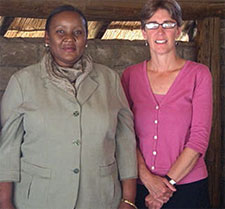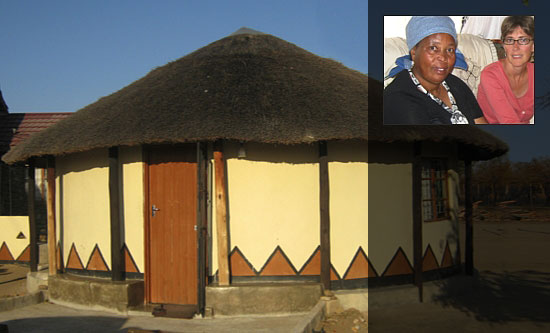


Consider this: Women comprise a mere 17 percent of the U.S. Congress. Meanwhile, the country that leads the world in women’s representation in parliament is the tiny, once genocide-stricken nation of Rwanda, which boasts 56 percent women in its Chamber of Deputies.
It’s an impressive, rather surprising statistic that wows. But perhaps even more interesting is the inevitable question it raises: why?

In fact, how is it that that eight of the 30 countries that lead the world in women’s representation in parliaments are in sub-Saharan Africa? And what impact has women’s increased presence had in these parliaments?
From her days in the early 1980s working with women’s groups on income-generating projects as a Peace Corps volunteer in Kenya, to her current scholarship on women’s participation in politics across Africa, Gretchen Bauer, professor and chair of the Department of Political Science and International Relations, has come full circle.
Today, she seeks to answer these questions about women’s increased political participation in Africa.
“In a part of the world in which the needs of women are many and where meeting the needs of women can have a significant impact on society as a whole, striving for gender parity is imperative,” she says.
Looking to the leading African countries — such as Rwanda, the world leader in women in parliament; South Africa, with among the highest percentage of women in its cabinet; and Liberia, with Africa’s first woman elected president — Bauer has found a shared combination of factors.
All but one of the eight leaders in women in parliaments — Rwanda, Seychelles, South Africa, Mozambique, Angola, Tanzania, Uganda and Burundi — have experienced political transitions in the past two decades, many in the aftermath of conflict.
“Post-conflict situations have often led to the drafting of new constitutions and electoral laws, with many countries or political parties adopting electoral gender quotas, typically around 30 percent,” Bauer explains.
Through diffusion effects, norms have traveled across borders from one country to another. Additionally, national women’s movements — and women who may have assumed leadership roles during times of conflict — have became integral players in their countries’ post-transition reconstructive efforts, most notably in the political arena.

But what have large numbers of women in many African parliaments actually accomplished?
To answer this question, Bauer has looked to women’s “substantive and symbolic representations.”
Substantive representation refers to the legislative and policy changes that women members of parliament (MPs) are able to effect. In many of these countries, women MPs have worked hard to ensure that national budgets are viewed through a gender lens and to achieve passage of women-friendly legislation in areas such as land rights, gender-based violence and family law.
In Rwanda, women MPs and their parliamentary caucus initiated and helped pass a bill to address gender-based violence in the country — the only bill to be initiated by members of parliament rather than cabinet ministers.
But it may be the symbolic representation effect — the ways in which women’s political presence influences attitudes and culture as well as other women’s participation in politics — that is having the greatest impact, according to Bauer.
Interestingly, the country that has been lauded as “Africa’s miracle” has one of the lowest rates of women in parliament in the world.
In Botswana — the longest standing democracy in Africa, with steady rates of economic growth and a cadre of highly capable women in the private and non-governmental sectors — women comprise less than eight percent of the National Assembly.
To understand why, Bauer spent seven months in the country in 2009, conducting in-depth interviews with women (and men) MPs and ministers, women candidates, political party leaders, women activists and government bureaucrats.
What she found was that Botswana, which is bordered on all sides by countries with high rates of women in legislative office, lacks several of the key characteristics of the other African countries that have so significantly increased women’s representation in their national legislature.
“Chief among those is a political conflict, or opening, that has led to the adoption of an electoral gender quota,” she says. In addition, she found many of the usual barriers to women’s participation in politics that one finds across the world.
And yet women are playing an increasingly larger role in politics there.
As states democratize and decentralize across Africa, more attention is being paid to the role of traditional leaders in local politics.
This is especially true in Botswana, where bogosi, or chieftaincy, thrives.
“Having experienced a mild colonialism in which chiefs retained some of their powers, Botswana accords a prominent role and privileges to chiefs today,” Bauer explains.
Historically, however, women have been excluded from the chieftaincy, only serving as regents until a son or nephew — a future chief — came of age. But in the last decade, more and more women have asserted their right to be chief, including ‘paramount chief’ of one of the eight Tswana ethnic groups.
On a return research trip to Botswana in 2011, Bauer investigated this phenomenon.
“The fact that you have women saying, ‘I want to be chief’ is quite telling,” she notes.
For Bauer, it suggests that the increased presence of women in African parliaments is having a symbolic representation effect on women who insist that they, too, may access political power that has in the past been reserved for men.
In interviews with all current and former women members of Botswana’s House of Chiefs, Bauer found this symbolic representation effect to be at play. She also found that women chiefs, whether at the ward or paramount level, also clearly consider the interests of their women constituents in many of the actions that they take.
In the future, Bauer hopes to look at the role that women are increasingly playing as cabinet ministers across sub-Saharan Africa, including heading up traditionally “male” ministries.
“While African women may lag behind in many important socioeconomic indicators,” she says, “in this political arena, women in several African countries are leading the world and setting an example for some of the most developed.”
